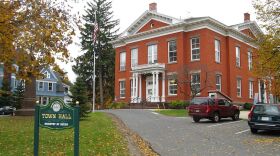Great Barrington, Massachusetts residents rejected new restrictions on marijuana businesses and a new downtown parking project at the town meeting Monday night.
On a hot, humid June evening, townsfolk gathered in the Monument Mountain Regional High School parking lot for Great Barrington’s second socially distanced town meeting in two years. A citizen’s petition to increase restrictions on marijuana businesses in the town stoked robust debate, dominating the first hour of the gathering. Michelle Loubert presented the proposed amendment to town bylaws.
“As stated in the master plan, residents expect and deserve quiet neighborhoods free from odor, glare, noise and other impacts of commercial activity," she said. "So how do we propose how to do this? Number one, returning the buffer zone to 500 feet as stated in the Massachusetts Cannabis Control Commission regulations. Also by expanding protections not just for schools but other places where children congregate such as playgrounds and town-owned beaches. Great Barrington’s buffer zone was 500 feet, but later it was reduced to 200 feet. What was the result? Retail marijuana shops located next door to toy shops, and there are more shops on the way.”
The amendment also would have banned marijuana businesses from residential areas and banned outdoor cultivation within 200 feet of a property line in the town of around 7,000 among other restrictions.
“The result? Our neighborhoods, our homes and the character of our neighborhoods would be protected from the adverse impacts that are often associated with this industry," continued Loubert. "After all, what other industry is required to pay an impact fee for any negative or adverse impact it may bring to a community?”
“This bylaw would zone the cannabis industry out of existence. I applaud the stated aims of the proposed bylaw – who could be against protecting our neighborhoods – but this proposal doesn’t do that," countered selectboard member Ed Abrahams, saying that the original state language around locations where children congregate was withdrawn due to the vagueness of the concept. “There’s literally no property zoned for retail and also 500 feet from a place where children commonly congregate – not even Theory Wellness.”
The business on Route 7 just north of the town’s core has brought millions in marijuana revenue into Great Barrington’s coffers since it became the first recreational cannabis dispensary to open in the county in January 2019.
“Right now, the only marijuana establishment that is allowed in a residential district is cultivation," said Abrahams. "Every farm in Great Barrington in a residential district. If this passes, this crop will not be available to farmers no matter how much land they have, how far they are from their neighbors and how small a marijuana crop they want to grow.”
Currently, a special permit is required to grow marijuana in Great Barrington.
“Some of the other language here would again outlaw any marijuana business, and if it was applied to other businesses, it would make all business illegal," said Abrahams. "Quote, ‘no use shall be allowed which creates a nuisance to abutters.’ Who’s defining nuisance? I live next to the library. They have outdoor children’s programming that I can hear in my house with the windows closed. I happen to love the sound of children singing, but I could see how someone else might call it a nuisance three days a week. Quote, ‘no odor can be detected at the exterior of a marijuana establishment. No noise can be detected at any adjoining use or property.’ No odor at all, ever? No noise at all? Again, that’s just not a reasonable expectation.”
Ultimately, voters rejected the measure in a 66 yes, 90 no decision – far short of the required two-thirds majority. They chose to accept new rules expanding citizens’ comment time at official town meetings but also turned down a $1.2 million plan to buy land for the creation of 50 new parking spots downtown.
Architect Pedro Pachano spoke out against the plan.
“Asking us to allocate $1.2 million through taxation, borrowing, or the use of available funds to store automobiles indicates the town administrators are less concerned with housing infrastructure or educating the teenagers of our region and the school that provides a healthy and safe place for them to learn," he said. "Aside from Great Barrington’s many pressing infrastructure needs, $24,000 per space can certainly help many seniors secure housing or make improvements which help keep them in place. The cost of five spots would go a long way towards down payment assistance for people who can afford a mortgage payment but not the down payment. The cost of 10 spots would go a long way towards upgrades to properties under the control of the Affordable Housing Trust Fund. A few more spots and maybe they could even build a house.”
The $12.9 million town operating budget for Fiscal Year 2022 passed with only a slight modification which added $25,000 to the public works line item. Also approved were the $18.4 million school district budget and the $3 million capital expense budget. A plan to spend $350,000 from the 3% of marijuana taxes collected specifically to mitigate community impact from the industry on youth substance use and abuse education was also accepted.







